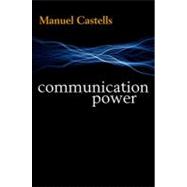
| Acknowledgments | p. ix |
| List of Figures | p. xiii |
| List of Tables | p. xv |
| Opening | p. 1 |
| Power in the Network Society | p. 10 |
| What is Power? | p. 10 |
| State and Power in the Global Age | p. 17 |
| Networks | p. 19 |
| The Global Network Society | p. 24 |
| The Network State | p. 38 |
| Power in the Networks | p. 42 |
| Power and Counterpower in the Network Society | p. 47 |
| Conclusion: Understanding Power Relationships in the Global Network Society | p. 50 |
| Communication in the Digital Age | p. 54 |
| A Communication Revolution? | p. 54 |
| Technological Convergence and the New Multimedia System: From Mass Communication to Mass Self-communication | p. 58 |
| The Organization and Management of Communication: Global Multimedia Business Networks | p. 71 |
| The Politics of Regulatory Policies | p. 99 |
| Cultural Change in a Globalized World | p. 116 |
| The Creative Audience | p. 127 |
| Communication in the Global Digital Age | p. 135 |
| Networks of Mind and Power | p. 137 |
| The Windmills of the Mind | p. 137 |
| Emotion, Cognition, and Politics | p. 146 |
| Emotion and Cognition in Political Campaigns | p. 150 |
| The Politics of Beliefs | p. 153 |
| The Framing of the Mind | p. 155 |
| Conquering the Minds, Conquering Iraq, Conquering Washington: From Misinformation to Mystification | p. 165 |
| The Power of the Frame | p. 189 |
| Programming Communication Networks: Media Politics, Scandal Politics, and the Crisis of Democracy | p. 193 |
| Power-making by Image-making | p. 193 |
| The Killing (Semantic) Fields: Media Politics at Work | p. 196 |
| The Politics of Scandal | p. 240 |
| The State and Media Politics: Propaganda and Control | p. 264 |
| The Demise of Public Trust and the Crisis of Political Legitimacy | p. 286 |
| Crisis of Democracy? | p. 295 |
| Reprogramming Communication Networks: Social Movements, Insurgent Politics, and the New Public Space | p. 299 |
| Warming Up to Global Warming: The Environmental Movement and the New Culture of Nature | p. 303 |
| The Network is the Message: Global Movements against Corporate Globalization | p. 339 |
| Mobil-izing Resistance: Wireless Communication and Insurgent Communities of Practice | p. 346 |
| ôYes, We Can!ö The 2008 Obama Presidential Primary Campaign | p. 364 |
| Reprogramming Networks, Rewiring Minds, Changing the World | p. 412 |
| Conclusion: Toward a Communication Theory of Power | p. 416 |
| Appendix | p. 433 |
| Bibliography | p. 489 |
| Index | p. 543 |
| Table of Contents provided by Ingram. All Rights Reserved. |
The New copy of this book will include any supplemental materials advertised. Please check the title of the book to determine if it should include any access cards, study guides, lab manuals, CDs, etc.
The Used, Rental and eBook copies of this book are not guaranteed to include any supplemental materials. Typically, only the book itself is included. This is true even if the title states it includes any access cards, study guides, lab manuals, CDs, etc.